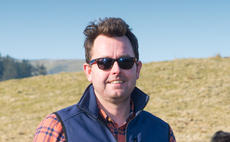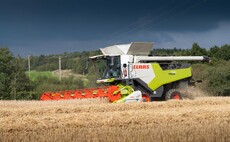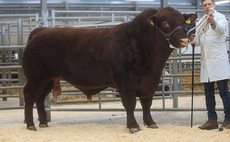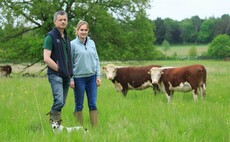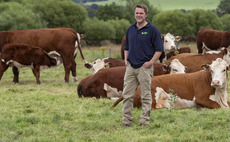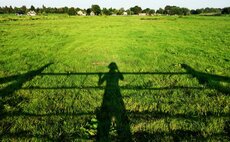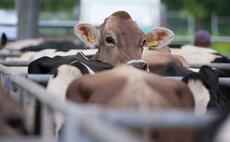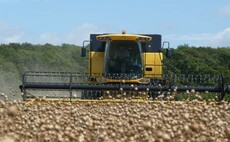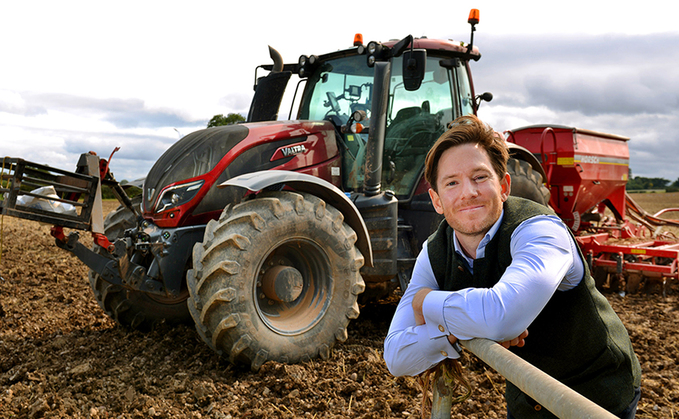
Launched by the School of Sustainable Food and Farming (SSFF), the Journey to Net Zero competition has an investment pot of 50,000 to financially support farmers developing sustainable farming practices. Some of the competitions sponsors discuss the work they or their customers are already doing to reach net zero.
BRADFORD ESTATES
Making most of the opportunities presented by the in-hand farmland on Bradford Estates to achieve true sustainability is the driving ambition of managing director, Alexander, Viscount Newport.
Lord Newport believes a holistic approach to the management of these assets on Bradford Estates will contribute to reaching net zero across the whole landed estates business, but will bring many other benefits as well.
When I returned to Bradford Estates three years ago, Oliver Scott, our farms director and I had the opportunity to build a new farming business, Bradford Farming, around our collective vision, he explains.
Regenerative
Adopting a regenerative approach was top of the list, and soil health formed a cornerstone of this, says Mr Scott.
We have looked at all aspects of our farm operations starting with the soil, but including seed variety choice, machinery use, agrochemical use, fertiliser applications and our rotation.
We now have a nine-year rotation on our in-hand land and this includes winter wheat, winter barley, oilseed rape, winter rye, winter oats, spring barley, spring beans and maize.
We also grow potatoes and lettuce one year in nine, and while it is difficult to balance these two crops in a regenerative system, we think it is important to support continuing to grow these crops in the UK. By incorporating them into a long rotation, we can mitigate for any negative environmental impacts.
Green cover
Keeping green cover across the entire farm year-round is also critical, Mr Scott says, with cover and catch crops playing an important role in this.
We grow a cover crop in front of all our spring crops, so land is never bare, and these are grazed by sheep. We also grow a catch crop between the potatoes and lettuce and then we drill autumn cereals directly into these.
Closer integration of the arable and the livestock enterprises will be an increasingly important element of the plans for Bradford Farming and the commencement of a Mid-Tier Countryside Stewardship Scheme this year is another step toward this.
Herbal leys and the two-year legume fallow options will slot easily into the arable rotation and we will graze these with sheep, Mr Scott says.
Lord Newport says continuing to monitor soil health, carbon emissions and hydrology will allow Bradford Farming to accurately monitor progress.
We have used the Farm Carbon Toolkit to measure our carbon footprint as a baseline and we plan to review the figures periodically.
Farm Facts
- The farmland managed in-hand on the 4,856 hectares (12,000 acres) Bradford Estates extends to 1,822ha (4,500 acres), of which, between 202ha (500 acres) and 243ha (600 acres) is grassland and the remainder is arable
- Bradford Farming carries out all farming operations and there is a joint venture sheep business to manage the sheep flock across the in-hand land
- All tractors and combines on the farm are leased to enable Bradford Farming to retain flexibility and to take advantage of technological advances
BILL QUAN, HEREFORD
As a tenant farmer, NFU member Bill Quan says the actions he has taken to move his farm towards net zero have been principally about reducing costs and improving efficiency.
Mr Quan says: As tenant farmers, we live off our ability to farm, not our property assets. Efficiency and cost savings drive our thinking and everything has to make financial sense and must minimise labour.
He has made changes both to his arable rotation and the beef and sheep enterprises to increase carbon sequestration, reduce greenhouse gas emissions and improve soil health.
Our first priority is to improve soil health and this will improve our margins. We have already substantially reduced our diesel use by adopting strip tillage across the farm this has saved us an estimated 10,000 litres in the first year, equating to 15,000.
After four seasons of min till we are seeing a recovery in our yields and soil conditions, organic matter and worm numbers are all substantially better.
We are looking for easy care and easy keeping beef and sheep genetics which can thrive off minimal inputs. Production from grass and herbal leys are key to delivering margin.
We have switched to making some hay to feed to our cows on our stewardship ground as it works well with the late cutting date and significantly reduces our plastic use.
Beef cows can live very modestly and maintaining them on a purely pasture based diet is entirely possible.
Approach
Taking ideas from organic and regenerative farming systems and the pasture fed approach, he says:
I aim for an optimal farming system which harnesses the benefits of science and traditional methods. As part of this I am looking to increasingly integrate our livestock enterprises into the arable rotation to further enhance soil health through the addition of organic matter.
Mr Quan believes farmers have a responsibility to do the right thing by the environment, but also to produce food from the most productive land in a manner which is acceptable to the consumer.
We can concentrate on farming the best land as efficiently as possible and put the marginal land into environmental schemes. By using variable rate applications I can make sure the nutrients are applied in the right place.
It is about farming the right crop in the right place and farming in harmony with the environment. We practice
production with protection mixing environmental schemes and commercial farming focused on soil health to deliver for all stakeholders.
Farm Facts
- The mixed farm produces combinable cereals, pulses, oilseeds, potatoes and maize
- Herd of 40 pedigree Limousin and Hereford cattle and a flock of 550 Easycare ewes
- The farm extends to 385 hectares (950 acres), of which, around 162ha (400 acres) is permanent or reseeded grassland and the remainder is in the arable rotation
LOW PROTEIN DIETS FOR BEEF CATTLE
A legacy of over-supply of protein to beef cattle results in significant feed waste across the sector, but also equates to avoidable, excess carbon emissions.
Dr James McCaughern, lecturer in beef production systems at Harper Adams University, says addressing this issue will help to tackle emissions from beef cattle and save money.
Feed accounts for about 70 per cent of the variable costs in beef production systems and so anything farmers can do to increase the efficiency of feed use will usually help to reduce both costs and carbon emissions intensity.
Precision feeding
Dr McCaughern has been researching precision feeding at Harper Adams and his work has shown the scope for significantly reducing the amount of protein fed to beef cattle.
He says: The protein content of UK growing and finishing beef rations typically ranges from 12 to 16 per cent in the dry matter. However, whenever we phrase this picture in the context of what the animal requires based upon performance, we find an overall story of excess protein supply.
Diet provision
The type of diet provision will also have an influence on this situation in terms of forage versus concentrate.
Nevertheless, all the diets in this study were formulated to 14 per cent crude protein and all supplied protein well in excess of need, ranging from 140 to 176 per cent of the animals requirements.
When we modelled a decreased inclusion of bought-in protein sources across all of the diets in this experiment, we observed a decrease in both diet costs and emissions intensity of feed provision*, Dr McCaughern explains.
Despite a decrease in the protein concentration of the diets to approximately 11 per cent in the dry matter in this study, protein supply was still predicted in excess of the animals requirements to maintain performance in all instances.
Dr McCaughern says specially formulated rations need not necessarily be more expensive than off the shelf products and the emissions savings could be significantly more than the figures quoted earlier if the current ration contains soya.
Replacing soya in a diet is an easy win when aiming to reduce carbon emissions as it has a high carbon footprint due to the land use changes which result from its place of origin.
*The cost of the precision diet decreased by a mean of 0.20 /kg of average daily gain (range of 0.31 to 0.10 /kg), and 11.1 per cent (range of 18 to 7 per cent) across all of the cattle diets respectively.
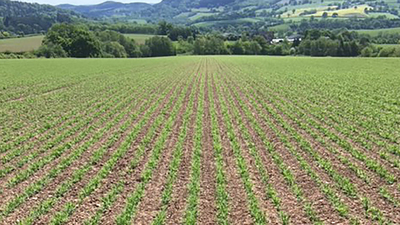
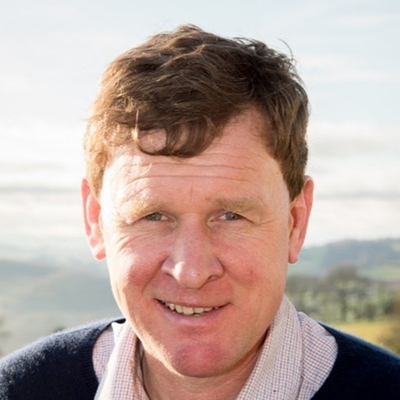
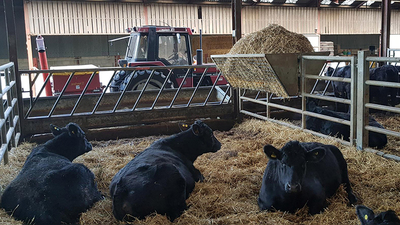
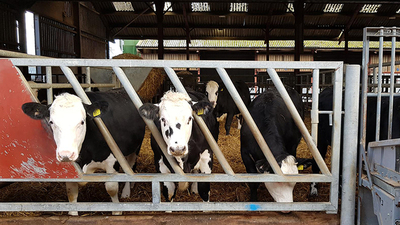









![Farming industry get behind FG's SAVE BRITAIN'S FAMILY FARMS campaign: "[This] campaign will help deliver our message to Government"](https://image.chitra.live/api/v1/wps/877bbe7/0f91ad70-ab9b-4ac9-bc2a-53dfa9e75558/10/BOB-Nigel-Owens-0848-Recovered-323x202.jpg)

